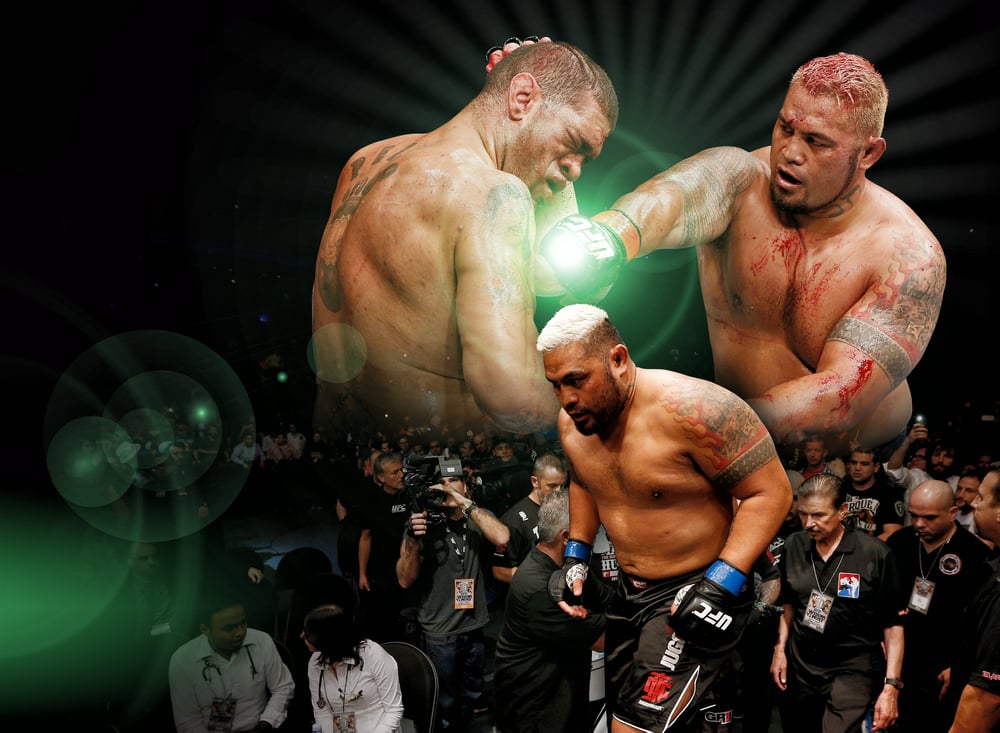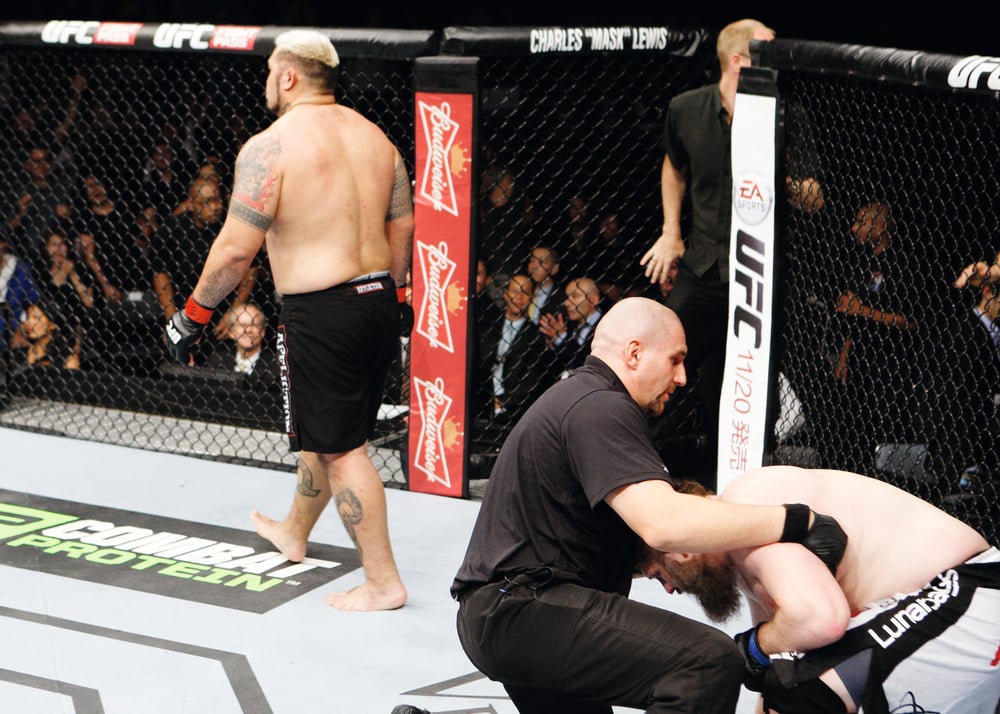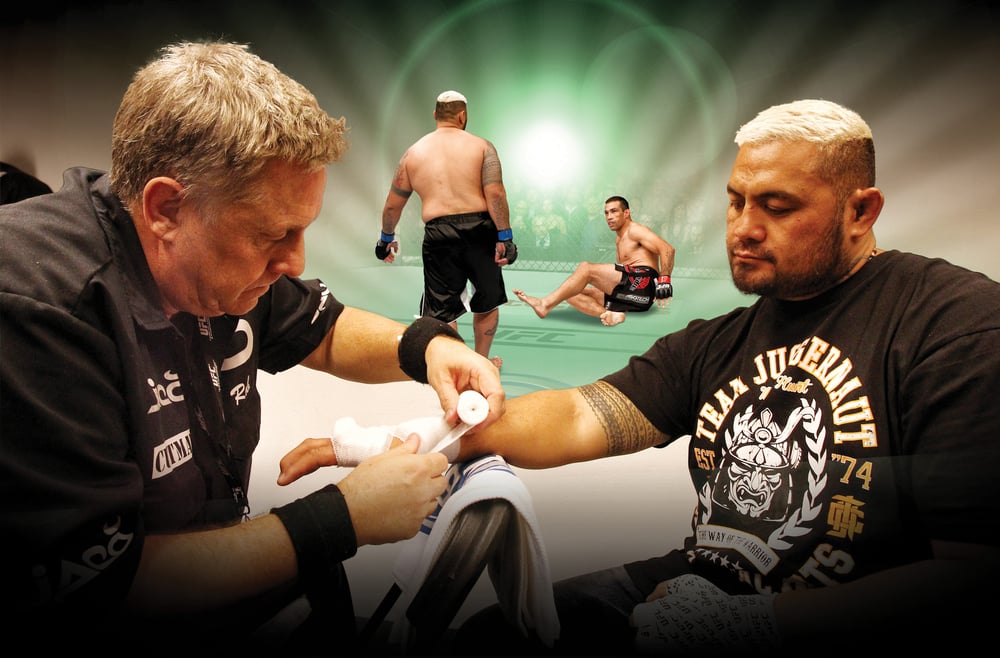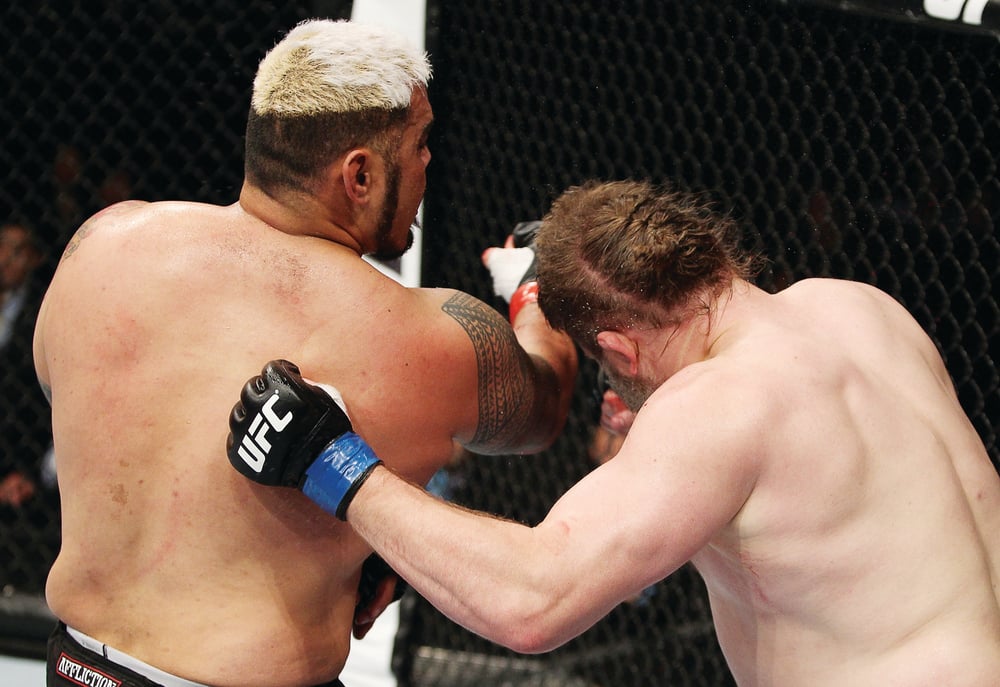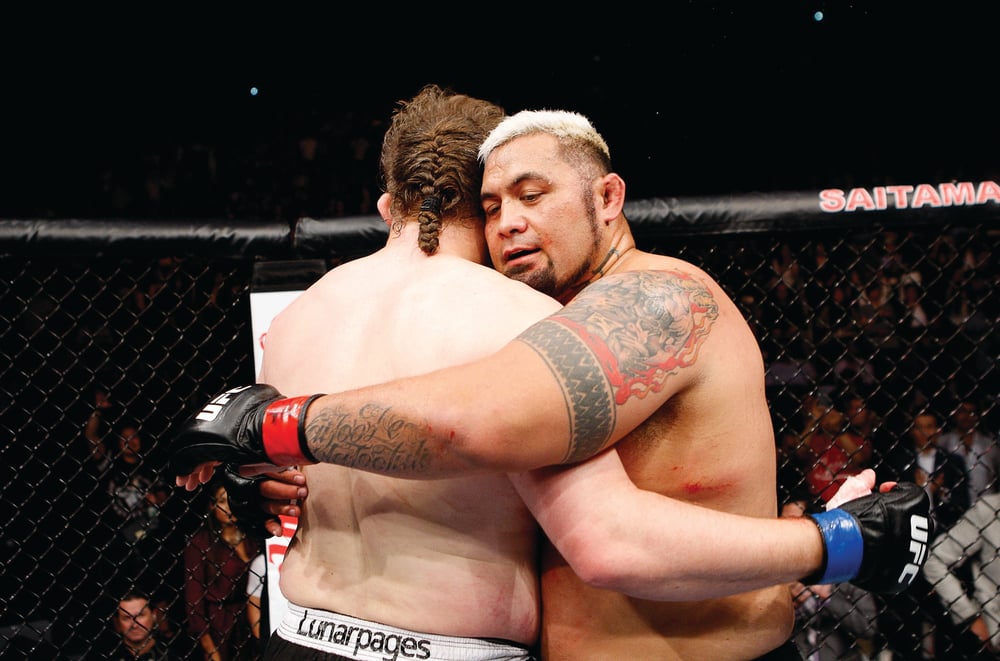
Issue 130
July 2015
Heavyweight ‘Cinderella Man’ Mark Hunt tells FO of his twilight career aspirations before he walks away from MMA.
He’s every MMA fanboy’s favorite heavyweight. Mark Hunt’s universal popularity is built on two things: his no-BS approach to his mixed martial arts career and the one-punch knockout power that enables a five-foot-ten, 260lb Kiwi to reduce the biggest athletes in the world to mere rubble.
Now into his 25th year of prizefighting, ‘The Super Samoan’ has one mission left before he performs his bespoke walkaway celebration on MMA forever: to be crowned UFC heavyweight champion.
Though the 41-year-old was knocked down by a defeat at the hands of Stipe Miocic in Australia in May, he’s not out yet. He knows he’s running out of time to climb to the top of the heavyweight division, but in an exclusive interview with Fighters Only, Hunt insists he’s leaving no stone unturned as he fights through the final bouts of his second, once unlikely, Zuffa contract.
From thoughts of blowing his brains out, to his failed attempts to set up a fighter union, why he believes novice fighters should look at the careers of Mike Tyson and Floyd Mayweather for guidance, along with every knockout in between, this is Mark Hunt exposed like never before.
Zero to hero
If Dana White had gotten his way, Mark Hunt would never have set foot in the Octagon. It’s something the UFC president freely admits. When Zuffa bought out Pride it was, in Dana’s words, “contractually obliged” to offer fights to Hunt and others – whether he liked it or not.
And who could blame White for harboring doubts? Riding a five-fight losing streak into his UFC career, Hunt was submitted in little over a minute on his debut by Sean McCorkle. It was the sole victory of ‘Big Sexy’s forlorn Octagon tenure.
On paper, The Super Samoan’s 5-7 MMA record was hardly the stuff of the UFC elite. But those five wins formed a fan-encapsulating unbeaten run in Pride from 2004-06 that included famous victories over MMA legends Wanderlei Silva and Mirko ‘Crop Cop’ on consecutive New Year’s Eve cards. So while Zuffa brass largely endured his arrival, hard-core fans held out hope there was much more to come.
Hunt, of course, won the K-1 World Grand Prix in 2001 – the ultimate prize in heavyweight kickboxing. He possessed dynamite in his fists. Though MMA’s ground game was his Achilles heel – as six submission defeats from his first seven losses testified – a veteran wrecking machine was just beneath the surface and looking for a turn of luck.
That finally came at UFC 127 in Hunt’s hometown of Sydney, Australia. With Zuffa simply looking to run down his Pride contract, Hunt was signed to fight on the untelevised preliminary card as a local ticket seller. He was matched against Team Death Clutch grappler Chris Tuchscherer, the training partner of recently relinquished heavyweight champion Brock Lesnar.
Yet while the wrestling-savvy opponent didn’t necessarily suit Hunt, the fight did. He avoided the takedown and dropped ‘The Crowbar’ twice, opening a serious cut over his left eye. Hunt was in his groove: rolling forward, unloading, connecting. Early in round two he landed a sweet right uppercut to finish the job.
The KO was so good, it was replayed on the PPV portion of the card after the main event. MMA fans worldwide rejoiced as the now legendary Mark Hunt walkaway KO celebration got its first Octagon airing. The Auckland-born heavyweight raised his arms and turned his back on his crestfallen victim long before the referee even had chance to intervene.
Finally, Mark Hunt’s career in the world’s premier mixed martial arts organization had begun. And he’s not looked back since. He even signed a new multi-fight contract back in August.
Walk away
“The walkaway celebration is something that just happened, I really don’t know where and when it started,” Hunt tells FO. “When I’m in there the adrenaline is pumping and I’m just firing in shots, looking for the finish. It just kind of happens, I guess.
“When you get someone, when you catch them right, you just kind of know that that’s it. He’s in there doing the same thing, trying to shoot you down, so when it lands that’s it. It’s over and the relief kicks in. You know it’s finished so you don’t have to chase him anymore.”
Hunt, who started his fight career with a Muay Thai bout as a teenager, admits knockout power is something he’s always possessed. So when he lands clean he knows that feeling. He knows when it’s over. “I’ve always had it, that feeling when you hit someone right and they go down. And it’s actually about respect,” he explains.
“I’d like to think I’ve always respected my opponents in that way. You know, if you keep punching them after they’re knocked out they could get brain damage or end up in the hospital. So, I just see it as a fight, nothing more. It’s not personal. I’m not stepping in there to hurt anybody. But if the man in front of me is still fighting then, you know, I’ll keep swinging. But when it’s over it’s over, I guess.”
One of Hunt’s most recent and spectacular knockouts came in September against iron-jawed Roy Nelson in Japan. The punch earned Hunt the much-coveted Fighters Only World MMA Awards ‘Knockout of the Year’ statue and he admits it was one of the most satisfying punches of his 65-fight pro pugilist record (which includes MMA, kickboxing and boxing).
“Over the years I’ve thrown a lot of shots that have scored a lot of knockouts, but it was just the timing of that one,” he says. “Roy’s a nice guy, you know. He’s a good fighter but he made a mistake and I just caught him.
“Any time you stand and trade in the pocket you run the risk of being caught, and that’s what happened. I mean, I made a mistake against (Fabricio) Werdum, you know. I ate one of his knees. That night it was my turn to make the mistake and I paid for it.”
After making his name in MMA with Pride, the performance was certainly not lost on the local fans inside the Saitama Super Arena either, the long-time home of the Japanese organization. And while Hunt doesn’t get too caught up on the romance of the venue, he does appreciate the support he gets from fight fans the world over.
“Being back in Japan and it being in Saitama didn’t really mean too much, if I’m honest. I’m just a fighting guy, I love fighting. Fighting is what makes Mark Hunt,” he says with a shrug.
“Obviously I’ve spent a lot of years fighting in Japan over the course of my career, so I’ve built up a bit of a following over there. The fans always seem to enjoy my fighting. But that’s because they know what they’re going to get. I like to put on a show for the fans and they respond to that, so the atmosphere is always good when I fight.”
Opportunity knocks
Hunt’s KO of Nelson was also rewarded with a fourth consecutive fight night bonus – unprecedented in the heavyweight division – along with, not surprisingly, a brand new UFC contract. It also led to an unlikely shot at the interim heavyweight championship.
Just three weeks after gunning down Nelson, Hunt’s phone rang. Champion Cain Velasquez was out of the UFC’s debut event in Mexico City, so Hunt was offered a shot at number-one contender Fabricio Werdum for the interim belt on four weeks’ notice.
Naturally, Hunt took it. Though he succumbed to a Werdum flying knee in the second round, he dominated the fight until that point and is itching to get another chance at the top prize in fight sports.
“Looking back I don’t have any regrets,” he says. “At the time I was offered a great opportunity to come in at late notice and fight for the title. It was an opportunity I couldn’t turn down. As a fighter, you don’t get many opportunities during a career so you have to take every one which comes up.
“Some have worked in my favor and others haven’t. But one thing I will say is that when my career does come to an end, whenever that maybe, I don’t want to look back and have regrets about anything.
“I’m not going to be sitting in some bar someplace, someday saying, ‘I could’ve been this or I could’ve been that.’ Shut up, you fool, nobody wants to hear those kinds of stories. You know what I mean. I want to have taken my shot.”
He’s adamant he’d jump at the chance again, should it ever come. “Of course, I’d take the fight (laughs). That’s not a question you even need to ask. I’ll take it at one day’s notice.
“This is the world f**king title we’re talking about, you know. It’s for all the marbles. It doesn’t get any bigger than that. You never know if that phone will ever ring again, you know. All the way, all the way (laughs). That’s the way I look at it anyway. As a professional fighter it’s all or nothing. Your hand is either down or it’s raised, there is nothing else.”
Aussie rules
Against all the odds, Hunt built on his kickboxing accomplishments to transform into Australia’s premier mixed martial artist. He’s built a legacy as a fighting pioneer on two frontiers, and his importance was demonstrated when he faced Stipe Miocic in Adelaide at UFC Fight Night 65 in May.
Hunt, who suffered a late TKO defeat, has become a headline attraction the UFC can build a card around, and an inspiration to fighters across Australasia. The promotion’s presence in the region is growing, and has given opportunities for its rising number of up-and-coming cage combatants to fight on the biggest stage in their own back yard.
Including Hunt, no less than 12 fighters from Australia and New Zealand featured in the Adelaide event. It’s something the elder statesman of the scene could have only dreamed of.
He says: “To go from a time not long ago when there were pretty much no other Australian or New Zealanders competing in the UFC to where we are now, with not one but two fight cards already confirmed for Australia this year, it’s incredible.
“After fighting all over the world throughout my career, to come back and fight at home – to headline a UFC card here – means so much to me. I’m 41 now and in the twilight of my career when the next fight could yet be my last, and so I’m really appreciative of what’s happening right now and my role in it. What can I say? I’ve been blessed by god. It’s great, it truly is.”
But asked if he’d like to be in their shoes, starting his career from scratch in the UFC of today, Hunt admits a lifetime of fighting has made him appreciate what he’s achieved rather than what he might have missed out on.
“I can’t be jealous of anybody, to be honest. Nobody has achieved like I’ve achieved in not just one, but two combat sports,” he says. “I’ve been fighting for 25 years and been at the very top of two sports for over 10 years too. Now I’m 41 so I just look at the next generation of fighters coming through and, you know, they’d be extremely lucky to have the kind of career I’ve had.
“And it’s not all been great. I’ve had bad influences, I’ve had tough nights, tough fights and been robbed of my money. I’ve been through it all. I’ve suffered so many pitfalls over the years that right now I’m just battle-hardened.
“The fact the sport has tidied itself up, and these kinds of things don’t happen like they used to, is beneficial for all these young guys. But to get to where we are now, guys like myself had to suffer. The thing I’m most proud of is that I came through all of that adversity and I’m still here; I’m still competing at the top.
“You don’t spend as many years in fight sports as I have without learning a lot about fighting, but also learning how not to get ripped off. Bad management and all that, it’s out there, but with experience you learn how to manage your career. Now the young guys today, they have to learn that too. Just hopefully not to the extent that we had to.”
Man of the people
Hunt is also keen to pass on his knowledge and experiences to the new generation. “Right now, to become a world-class fighter, you have to come through all this stuff. You have to learn about every aspect of the sport, both the fighting and business side, to ensure you maximize your career and especially your earnings. Just to make a living in fight sports is ridiculous.
“There are so many ways in which you can harm yourself: from bad management, to bad coaches, to bad matchmaking. You’ve got to learn as much as you can as quickly as you can and that’s why I always try and make myself available to any young fighter who wants to pick my brains about anything.
“When you have the right coaches, when you have the right management, when you have the right sparring and the right promotion in your corner, then that’s how you become a word champion. I know. I’ve benefited from all those things. Getting good people to help you is imperative.
“Look at Mike Tyson, for instance. Imagine if he hadn’t met Cus D’Amato, or if Floyd Mayweather was born into a different family. Do you honestly believe they would have become the fighters they did?
“Once you surround yourself with the right people, then you can take all the opportunities that come your way because you know you’re doing the right thing and heading in the right direction. Then you don’t end up being the guy sat at the end of the bar complaining about how you never got your shot, while everybody else in the bar is thinking you’re nuts... ‘Oh, I could have been the world champion.’ ‘Yeah, shut the hell up, man, you never did and you’re not.’ It’s one of those.”
He adds: “But there are a lot of big companies looking after fighters now, a lot of smart people backed up with lawyers and all that, so it’s much better now. There’s much more support. And you need resources like that so you can focus on just fighting, and use all your efforts in getting better. I can’t emphasize how important that is either. You need the right people around you to be the champion.”
Hunt is a big advocate of a fighters’ union, but again experience has proven to him that the formation of one sounds easy but is practically impossible to set up. “I tried to start a fighters’ union years ago, actually. About 11 years ago, with my manager at the time, but the guys who have made it to the top didn’t want to give up the fruits of their labor.
“The problems with unions are that the wrong people get in charge and they end up as bad as the promoters. They end up ripping fighters off too. I honestly believe that a fighters’ union would be good, but you first need 51% of fighters across the world to join, then everybody else will have to join in. But it’s easy saying that.
“Try asking a guy who’s worked his way up from nothing to get to the top and to get to a slice of the pay-per-view dollars to get involved and see what he says then. I’ll tell you now what his response will be, ‘Nah mate, I worked my butt off to get here and worked through all these holes to get to the top. Now you want me to help someone else cut corners to get to me. Nah, mate, let them go through the same things I did.’ That’s unfortunately how it works.
“It would be good to have a fighters’ union and in a perfect world we would have one. But it’s difficult to introduce one now.”
Last man standing
The fighters’ union revelation may come as a surprise. After all, Hunt is infamous for being something of a lone gunman. He’s got one of the smallest entourages in MMA and more often than not can be found wandering around on his own before events.
When he fought Werdum in Mexico City, Hunt arrived alone at the airport from Australia. His corner team flew in on the day of the fight. It’s another characteristic born from more than two decades of experience.
“I don’t need a big group around me. What would I need an entourage for? I mean, shucks, I can wipe my own arse after I s**t. I don’t have to worry about looking over my shoulder. I don’t owe anybody any money and I haven’t done anything bad to anyone – as far as I know. So I’m not worried about looking behind me.
“The only Boogeyman around me is me, so yeah, I don’t need no entourage. Plus it costs too much money to have an entourage anyway. Do I look like I could afford to waste money on stuff like that? I’m not making Mayweather or (Manny) Pacquiao money y’know.”
With just five fights left on his UFC contract – Zuffa originally wanted Hunt to sign for eight fights, Hunt wanted only four, they finally settled on six – the clock is ticking on his fighting and mixed martial arts career.
He knows he’s entering the twilight of his fighting life. And all he wants to do now is go out with a bang. Hunt adds: “There’s not one particular fight or particular night that stands out above the rest if I’m honest. It’s right here, right now, being able to headline different cards in different parts of the world and still being one of the best in the world – this is definitely my best time.
“Just being here for so long, representing Australia and still being in the top 10 in the world after all this time, still competing against the best fighters in the world even though I’m 41, that’s my highlight.
“Don’t get me wrong, over the years I’ve had plenty of hard times too. On plenty of occasions I’ve wanted to shoot my head off with a gun (laughs) for being a fighter. There’s been too many times like that to even recall... But then fighting is a roller coaster ride. There are ups and downs. You’ve just got to enjoy the best parts when you can.”
It won’t be long before Mark Hunt walks away for the final time, he just hopes it’s not before he satisfies his legions of fans by having gold wrapped around his waist.
...

